With the increased supply of electric cars, there are now more options available in the new Hyundai Kona, that was launched towards the end of 2023. The Kona range has doubled from seven models to now 14 variants, including a petrol engine, hybrid drive and full electric drive options. Now there’s a wider choice in this mid-range SUV hatchback car from Korea’s largest car brand that’s taking the Irish market by storm.
After the Kona offering was updated with this second-generation Kona some months ago, I’ve more recently had the opportunity to test drive the hybrid petrol version and new electric version, almost back-to-back. That gave me an opportunity to assess the cars and what’s the value of taking their hybrid choice when there are other options.
For many families, the choice of a Kona may be that of a second family car, or the family car to supplement a 4x4 or van. So it has to be reasonably spacious, practical, affordable to run and value for money. This latter point is always debatable, especially as new car prices have soared.
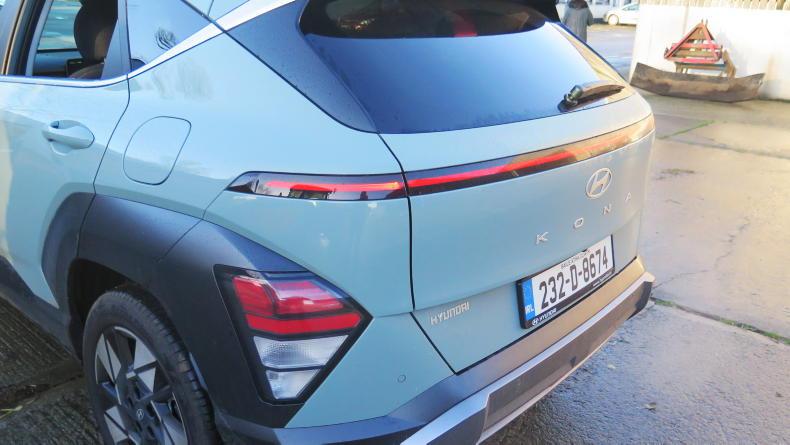
Styling is almost similar between the new Hyundai Kona EV and PHEV models; it is modern and impressive, with semi-automatic electric boot opening and closing.
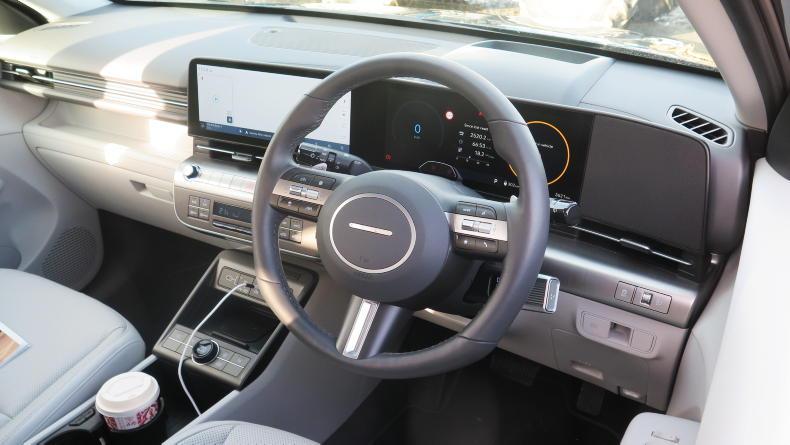
The dash on the new Hyundai Kona EV and PHEV versions is clear and uncluttered, with a neat column shift system for drive section and easy control of the driving modes.
We are being told that electric car options have become more affordable and on a simple comparison that’s probably true. In the case of the Kona, like so many other cars in this segment of the market, they’ve become more affordable relative to petrol or diesel cars, because these cars have risen significantly in price.
I’ve done a Kona example, where the price difference between the January 2023 entry-level Kona petrol and the same car today, has risen by a massive €5,500 in just one year. The electric car prices don’t have to change very much to seem affordable when engine-powered cars are hitting such extraordinary price increases. That explains how the motor trade manages to put car prices such as those of the new Kona electric options into some perspective.
Because we have so many Northern Ireland readers, we always strive to publish new car prices for all. What’s interesting about the new Kona is that the electric version is more price competitive south of the border, while the price difference in terms of the hybrid version is more significant.
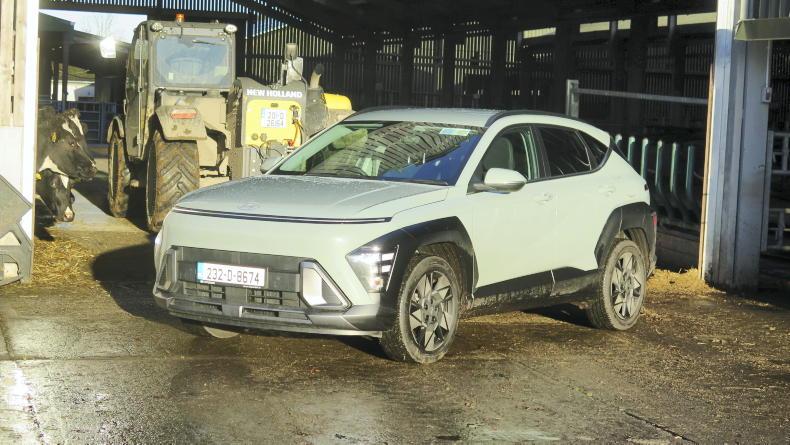
The new Hyundai Kona plug-in hybrid (PHEV) is a compact SUV hatchback. It is reasonably spacious, with good safety credentials and an entry price of €35,795 or £30,025 in N. Ireland.
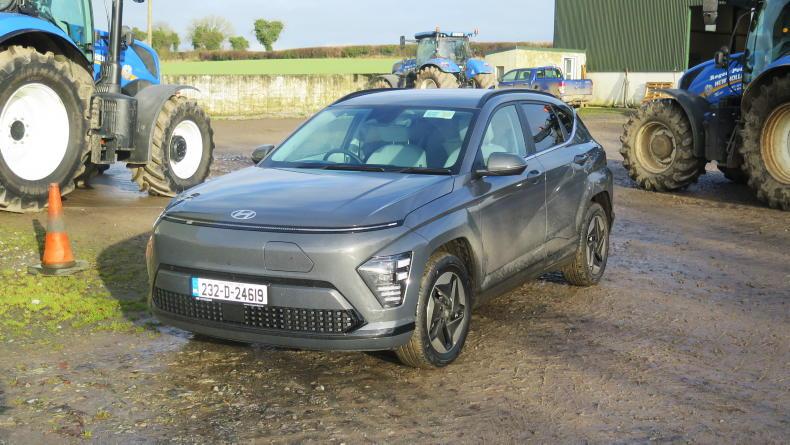
The all-electric version of the Hyundai Kona is impressive on the road, easy to use and affordable to run, but entry prices start at €35,795 and you need to go to the bigger battery version for €5,000 to have range comfort.
Leaving the money aside, the Kona offerings from Hyundai are impressive in other respects. The electric version came with a 450km range on a full battery and delivered that in a practical sense, which is always the first point of information. I don’t skimp on heating or air conditioning when I’m driving an electric car, because otherwise the test is not a true comparison. The Kona economy figure averaged at 17.7kWhr/100km, which was slightly poorer that the rated figure.
The plug-in hybrid (PHEV) version of the Kona, which has very similar looks and is powered by a 1.6l petrol engine, came with a range of 698km on a full tank of petrol. There was a short 50km electric-only driving range with the plug-in. In reality, I find that plug-in hybrids don’t impress me because most of my journeys are longer ones and the time spent on charging for this relatively small bonus, is rarely worth it in my case.
I drove the Kona PHEV mostly in eco driving mode, same as the EV version, to maximise their economy potentials, and in neither case did this greatly compromise their driving ability.
There are eco, normal, sport and snow driving modes in the Kona EV and setting your choice is easy and clear to the driver.
Both cars use a column shift automatic transmission control that I found very easy to get used to, and it left the lower dash area between the driver and front passenger uncluttered.
Neither cars are strong contenders in the towing stakes, with just a 750kg braked trailer rating, while the petrol only version comes with double that towing ability at 1300kg.
Overall, I preferred the full electric choice with all of the benefits of fast and smooth acceleration, great solid road holding and lower overall running costs. The running costs of electric cars can be competitive on farms where grant-aided solar panels are in place.
This clearly is the most cost-effective way top run any car today because in Irish conditions, we rarely drive to the battery limit of 450km in any one day.
There is still an entry price gap between the petrol, PHEV and EV versions of the new Hyundai Kona.
The basic entry Kona petrol price is €30,895 (£25,725 in NI), jumping to €32,495 for the most tempting basic electric version, while the PHEV entry price is €35,795. But you really need to go to the most powerful 64kW battery version range comfort and that starts at €39,995 or £40,395 in NI, so that’s the real comparison as to why electric cars are so expensive and why it might still be early to make the cross over to electric.
With the increased supply of electric cars, there are now more options available in the new Hyundai Kona, that was launched towards the end of 2023. The Kona range has doubled from seven models to now 14 variants, including a petrol engine, hybrid drive and full electric drive options. Now there’s a wider choice in this mid-range SUV hatchback car from Korea’s largest car brand that’s taking the Irish market by storm.
After the Kona offering was updated with this second-generation Kona some months ago, I’ve more recently had the opportunity to test drive the hybrid petrol version and new electric version, almost back-to-back. That gave me an opportunity to assess the cars and what’s the value of taking their hybrid choice when there are other options.
For many families, the choice of a Kona may be that of a second family car, or the family car to supplement a 4x4 or van. So it has to be reasonably spacious, practical, affordable to run and value for money. This latter point is always debatable, especially as new car prices have soared.

Styling is almost similar between the new Hyundai Kona EV and PHEV models; it is modern and impressive, with semi-automatic electric boot opening and closing.

The dash on the new Hyundai Kona EV and PHEV versions is clear and uncluttered, with a neat column shift system for drive section and easy control of the driving modes.
We are being told that electric car options have become more affordable and on a simple comparison that’s probably true. In the case of the Kona, like so many other cars in this segment of the market, they’ve become more affordable relative to petrol or diesel cars, because these cars have risen significantly in price.
I’ve done a Kona example, where the price difference between the January 2023 entry-level Kona petrol and the same car today, has risen by a massive €5,500 in just one year. The electric car prices don’t have to change very much to seem affordable when engine-powered cars are hitting such extraordinary price increases. That explains how the motor trade manages to put car prices such as those of the new Kona electric options into some perspective.
Because we have so many Northern Ireland readers, we always strive to publish new car prices for all. What’s interesting about the new Kona is that the electric version is more price competitive south of the border, while the price difference in terms of the hybrid version is more significant.

The new Hyundai Kona plug-in hybrid (PHEV) is a compact SUV hatchback. It is reasonably spacious, with good safety credentials and an entry price of €35,795 or £30,025 in N. Ireland.

The all-electric version of the Hyundai Kona is impressive on the road, easy to use and affordable to run, but entry prices start at €35,795 and you need to go to the bigger battery version for €5,000 to have range comfort.
Leaving the money aside, the Kona offerings from Hyundai are impressive in other respects. The electric version came with a 450km range on a full battery and delivered that in a practical sense, which is always the first point of information. I don’t skimp on heating or air conditioning when I’m driving an electric car, because otherwise the test is not a true comparison. The Kona economy figure averaged at 17.7kWhr/100km, which was slightly poorer that the rated figure.
The plug-in hybrid (PHEV) version of the Kona, which has very similar looks and is powered by a 1.6l petrol engine, came with a range of 698km on a full tank of petrol. There was a short 50km electric-only driving range with the plug-in. In reality, I find that plug-in hybrids don’t impress me because most of my journeys are longer ones and the time spent on charging for this relatively small bonus, is rarely worth it in my case.
I drove the Kona PHEV mostly in eco driving mode, same as the EV version, to maximise their economy potentials, and in neither case did this greatly compromise their driving ability.
There are eco, normal, sport and snow driving modes in the Kona EV and setting your choice is easy and clear to the driver.
Both cars use a column shift automatic transmission control that I found very easy to get used to, and it left the lower dash area between the driver and front passenger uncluttered.
Neither cars are strong contenders in the towing stakes, with just a 750kg braked trailer rating, while the petrol only version comes with double that towing ability at 1300kg.
Overall, I preferred the full electric choice with all of the benefits of fast and smooth acceleration, great solid road holding and lower overall running costs. The running costs of electric cars can be competitive on farms where grant-aided solar panels are in place.
This clearly is the most cost-effective way top run any car today because in Irish conditions, we rarely drive to the battery limit of 450km in any one day.
There is still an entry price gap between the petrol, PHEV and EV versions of the new Hyundai Kona.
The basic entry Kona petrol price is €30,895 (£25,725 in NI), jumping to €32,495 for the most tempting basic electric version, while the PHEV entry price is €35,795. But you really need to go to the most powerful 64kW battery version range comfort and that starts at €39,995 or £40,395 in NI, so that’s the real comparison as to why electric cars are so expensive and why it might still be early to make the cross over to electric.









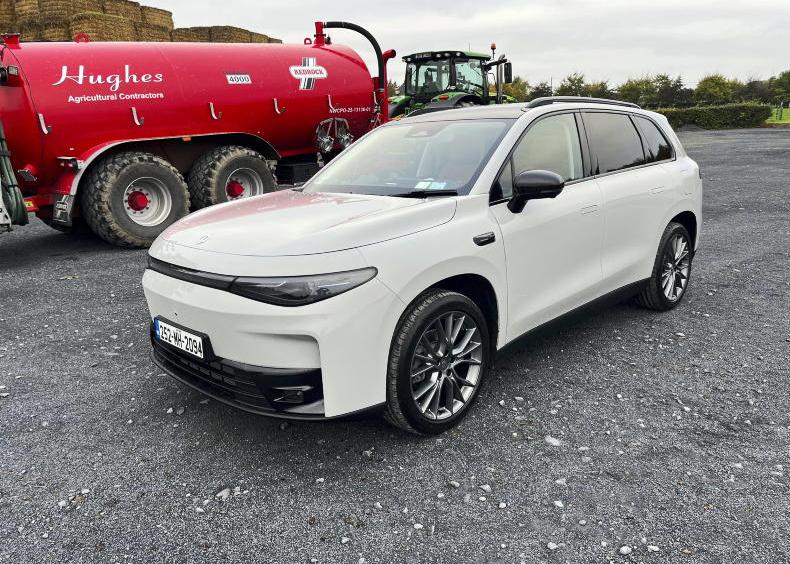



SHARING OPTIONS